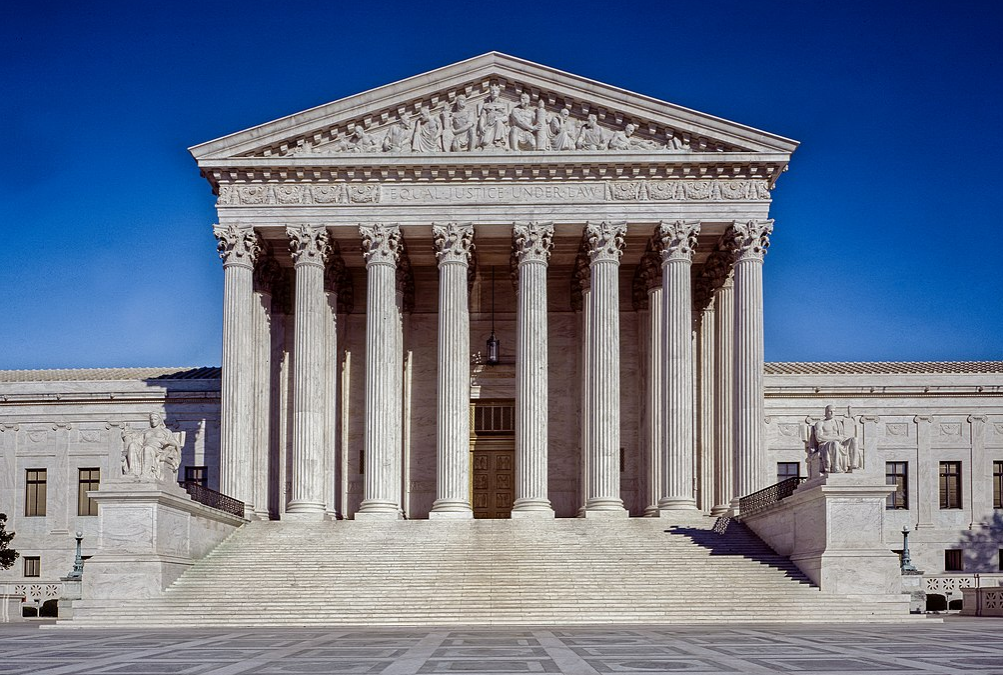By PAULA TRACY, InDepthNH.org
CONCORD – The U.S. Supreme Court has decided not to hear a case New Hampshire brought against neighboring Massachusetts over taxing remote workers during the pandemic.
Gov. Chris Sununu claimed it was not fair for the Bay State to collect income taxes on people who commute to work there, but could not access their desks and offices because of COVID-19 and took Massachusetts to court.
It would have challenged the Massachusetts Department of Revenue’s rule imposing a state income tax on Granite Staters who were working at home for Massachusetts companies but it will not be heard after all.
On Monday, both Republican and Democratic leaders in the state expressed disappointment.
A copy of the ruling can be found here https://www.scotusblog.com/case-files/cases/new-hampshire-v-massachusetts/.
Sununu issued the following statement: “By siding with the Biden Administration and allowing inappropriate taxation of NH citizens, the Supreme Court is setting a costly precedent. This decision will have lasting ramifications for thousands of Granite State residents.”
The decision to deny a hearing was made by the justices on June 28 with Justice Clarence Thomas and Justice Samuel Alito willing to grant the motion, according to the U.S. Supreme Court.
New Hampshire House Majority Leader Jason Osborne, R-Auburn, said he was disappointed with the decision.
“After two years of trying to force an income tax on New Hampshire, Democrats can thank Massachusetts for doing their dirty work for them. As if the transformational, pro-growth budget we just passed last week were not enough, Massachusetts gives just one more reason for businesses to move to New Hampshire.”
New Hampshire Senate Democratic Leader Donna Soucy, D-Manchester, and Deputy Senate Democratic Leader Cindy Rosenwald, D-Nashua, issued a joint statement following the Supreme Court’s refusal to take up New Hampshire v. Massachusetts.
“Granite State workers who were following public health guidelines at the height of the COVID-19 pandemic should not be punished with an out-of-state income tax. We are disappointed in the Supreme Court’s decision to not take up New Hampshire’s motion which would have challenged this anti-worker ruling.”
Members of the state’s congressional delegation also commented.
Congressman Chris Pappas, D-NH, criticized the Supreme Court’s decision to reject, without explanation, New Hampshire’s challenge and said he plans to help reintroduce legislation he co-led to address this issue in the coming weeks.
“I’m incredibly disappointed the Supreme Court chose to reject New Hampshire’s challenge without explanation, leaving tens of thousands of Granite Staters unfairly paying an income tax to Massachusetts for remote work done during a global pandemic,” said Pappas. “It is clear that the most effective solution at this juncture is a legislative fix, one I’ve been pushing since the early days of the pandemic. No one working in New Hampshire should ever pay Massachusetts income tax. At a time when telework is increasingly common and when every dollar counts for New Hampshire families recovering from this economic crisis, I will continue to fight to protect Granite Staters’ hard-earned money from unfair, out-of-state taxes.”
Following the start of the pandemic, in a break from clearly established precedent, the Commonwealth of Massachusetts began forcing Granite Staters who are employed by Massachusetts companies to pay Massachusetts state income tax on money earned while teleworking in New Hampshire.
The Multi-State Worker Tax Fairness Act, which Pappas helped introduce in the last Congress, would protect New Hampshire residents from unfair taxation by clarifying that workers are only required to pay income tax to the state where they were physically present when the income was earned. Specifically, for teleworking Granite Staters employed by companies based in other states, the bill would eliminate the need to pay any state income tax whatsoever.
U.S. Rep. Annie Kuster, D-NH, said the nation’s health crisis should have been a consideration by the high court.
“The Supreme Court’s refusal to consider this case could have long-term consequences for our state’s workforce and places additional financial strain on hardworking NH families who are being forced to pay income taxes for a state in which they do not live during a public health and economic crisis.
“I maintain that the Massachusetts rule change is an unconstitutional violation of state sovereignty, and I will continue working in Congress to pass laws and ensure no state has the authority to infringe upon the economic freedom and liberty of our New Hampshire citizens,” Kuster said.
Others also reacted.
Americans for Prosperity-New Hampshire State Director Greg Moore said, “Massachusetts’ cash grab hurts Granite Staters who followed COVID-19 protocols from the state of Massachusetts. This effort forces any former Massachusetts commuter, no matter where they live, to pay the state’s high-income taxes. Granite Staters across the political spectrum recognize the harm this would have on workers.”
New Hampshire filed the suit in October 2020 and Massachusetts opposed it on Dec. 11, 2020.





